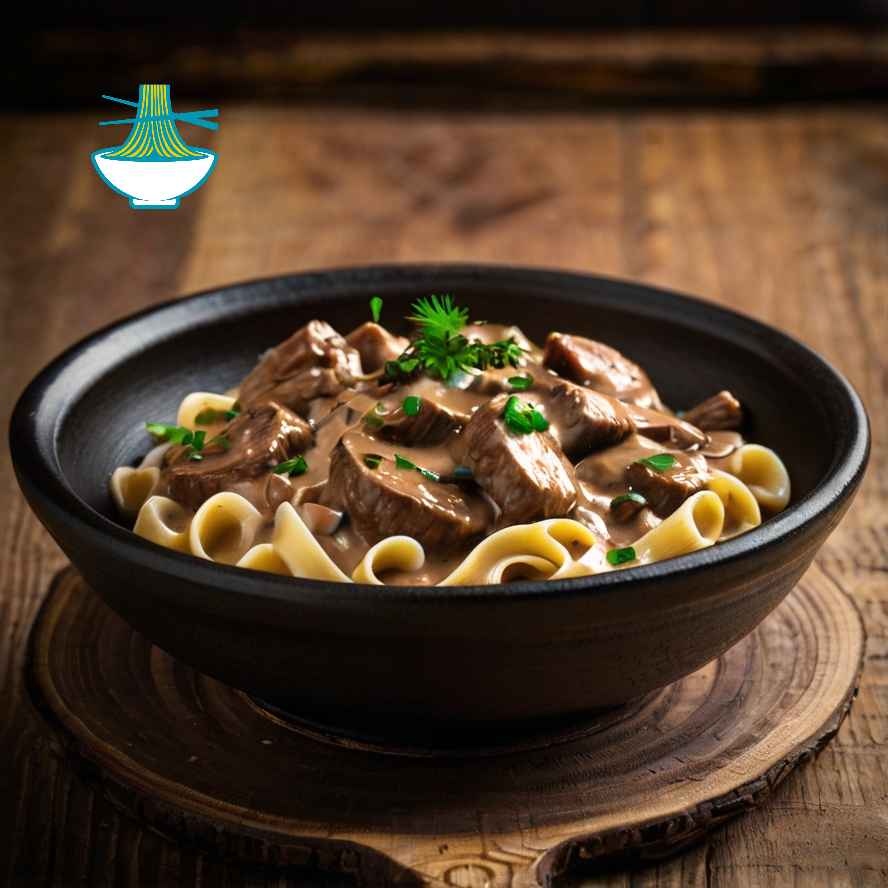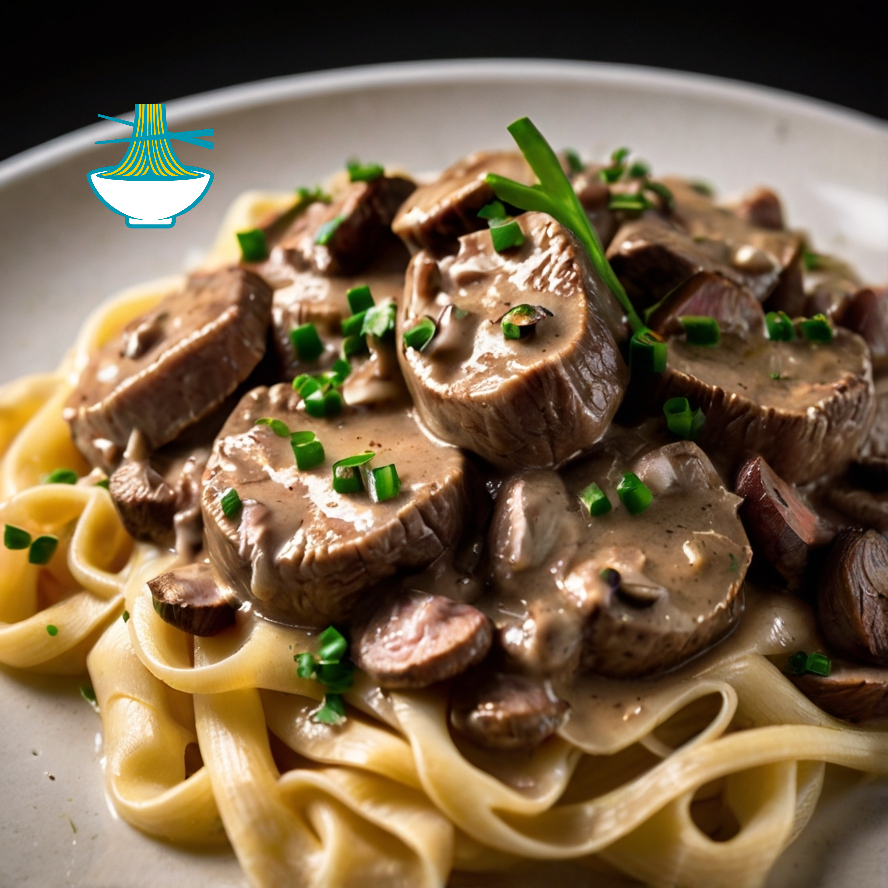Discover the ultimate Beef Stroganoff recipe! Tender sautéed beef cooked in a rich, creamy mushroom sauce, perfect for serving over noodles or rice. This classic dish is easy to make and packed with flavor, ideal for a comforting weeknight meal or special occasion.
Ingredients:
- 1 lb (450g) beef sirloin or tenderloin, thinly sliced
- 2 tbsp olive oil
- 1 large onion, finely chopped
- 3 cloves garlic, minced
- 1 cup (250ml) beef broth
- 1 cup (250ml) sour cream
- 1 cup (250g) mushrooms, sliced
- 2 tbsp all-purpose flour
- 1 tbsp Dijon mustard
- 1 tbsp Worcestershire sauce
- Salt and pepper, to taste
- Fresh parsley, chopped (for garnish)
- Cooked noodles or rice, for serving
Instructions:
Prepare the Beef: Season the beef slices with salt and pepper. Heat the olive oil in a large skillet over medium-high heat. Add the beef slices and cook until browned on all sides, about 2-3 minutes per side. Remove the beef from the skillet and set aside.
Sauté the Vegetables: In the same skillet, add the chopped onion and cook until translucent, about 3 minutes. Add the garlic and cook for an additional minute.
Cook the Mushrooms: Add the sliced mushrooms to the skillet and cook until they are tender and have released their juices, about 5 minutes.
Make the Sauce: Sprinkle the flour over the vegetables and stir to combine. Cook for 1 minute, then gradually add the beef broth, stirring constantly to avoid lumps. Stir in the Dijon mustard and Worcestershire sauce. Bring the mixture to a simmer and cook until it thickens, about 3-4 minutes.
Combine and Finish: Reduce the heat to low and stir in the sour cream. Return the cooked beef to the skillet and simmer until the beef is heated through and coated with the sauce, about 5 minutes. Adjust seasoning with salt and pepper if needed.
Serve: Serve the Beef Stroganoff over cooked noodles or rice. Garnish with chopped fresh parsley.
Enjoy your delicious, homemade Beef Stroganoff!
Nutritional Values
Beef Sirloin or Tenderloin (1 lb or 450g, thinly sliced)
- Approximately 850 calories
- 60 grams of fat
- 0 grams of carbohydrates
- 70 grams of protein
Benefits: Provides high-quality protein and essential nutrients like iron, zinc, and B vitamins. Supports muscle growth and overall health.
Olive Oil (2 tbsp)
- About 240 calories
- 28 grams of fat
- 0 grams of carbohydrates
- 0 grams of protein
Benefits: Contains healthy monounsaturated fats and antioxidants. Supports heart health and adds flavor to the dish.
Onion (1 large, finely chopped)
- About 60 calories
- 0.2 grams of fat
- 14 grams of carbohydrates
- 1.5 grams of protein
Benefits: Contains antioxidants, vitamins C and B6. Supports heart health and adds flavor to the dish.
Garlic (3 cloves, minced)
- About 13 calories
- 0 grams of fat
- 3 grams of carbohydrates
- 0.6 grams of protein
Benefits: Contains compounds with potential anti-inflammatory and immune-boosting properties. Adds flavor and aroma.
Beef Broth (1 cup or 250ml)
- About 15 calories
- 0 grams of fat
- 1 gram of carbohydrates
- 1 gram of protein
Benefits: Adds flavor and moisture. Contains minerals and helps in creating a rich sauce.
Sour Cream (1 cup or 250ml)
- About 450 calories
- 40 grams of fat
- 10 grams of carbohydrates
- 6 grams of protein
Benefits: Adds creaminess and richness. Contains calcium and supports bone health.
Mushrooms (1 cup or 250g, sliced)
- About 35 calories
- 0.5 grams of fat
- 5 grams of carbohydrates
- 3 grams of protein
Benefits: Low in calories, high in antioxidants, vitamins D and B. Supports immune health and adds umami flavor.
All-Purpose Flour (2 tbsp)
- About 60 calories
- 0.2 grams of fat
- 13 grams of carbohydrates
- 1.5 grams of protein
Benefits: Used as a thickening agent for the sauce. Provides carbohydrates and some protein.
Dijon Mustard (1 tbsp)
- About 15 calories
- 0.8 grams of fat
- 1 gram of carbohydrates
- 0.6 grams of protein
Benefits: Adds tangy flavor. Contains antioxidants and supports digestive health.
Worcestershire Sauce (1 tbsp)
- About 15 calories
- 0 grams of fat
- 3 grams of carbohydrates
- 0 grams of protein
Benefits: Adds complex flavor. Contains ingredients like vinegar and spices that contribute to the overall taste.
Salt and Pepper (to taste)
Salt
- Minimal calories and macronutrients.
Benefits: Enhances flavor. Use in moderation to manage sodium intake.
Black Pepper
- About 6 calories (for 10-12 peppercorns)
- 0.3 grams of fat
- 1 gram of carbohydrates
- 0.3 grams of protein
Benefits: Adds flavor and contains antioxidants. May support digestion.
Fresh Parsley (for garnish)
- About 5 calories (per tablespoon of chopped parsley)
- 0.1 grams of fat
- 1 gram of carbohydrates
- 0.3 grams of protein
Benefits: Adds freshness and flavor. Rich in vitamins A, C, and K, and has antioxidant properties.
Cooked Noodles or Rice (for serving)
- Noodles (1 cup cooked): About 220 calories, 1 gram of fat, 45 grams of carbohydrates, 7 grams of protein.
- Rice (1 cup cooked): About 200 calories, 0.5 grams of fat, 45 grams of carbohydrates, 4 grams of protein.
Benefits: Provides carbohydrates for energy. Noodles and rice complement the dish and make it more filling.


Comments